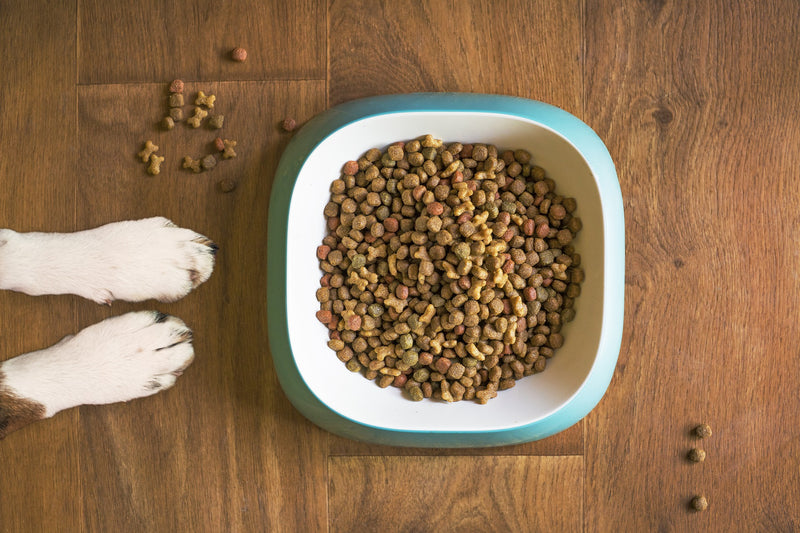Published: January 2021 | Updated: December 2022
Do you have a dog that never seems to have normal poop? Do you feed a high-quality diet but believe your dog isn't looking or feeling as good as they should?
Supplements containing digestive enzymes for dogs may be the answer to your problems!
Your Dog’s Natural Digestive Enzymes
If you're a dog owner, you've probably heard of digestive enzymes. If not, here's the deal: They're like vitamins for dogs—but better! Enzymes are substances naturally produced by all living things to help them process food. In humans and other animals, they aid in digestion, but they also have many other important roles.
For example, enzymes help build healthy bones and muscles through chemical reactions involved in bone formation. They also play a key role in repairing tissues damaged by injuries or disease or by normal wear and tear over time (which happens with all of us).
For the purposes of this article, we will discuss the main role of digestive enzymes. Digestive enzymes are proteins that are naturally produced by both animals and plants. They work to help break down food into its individual components that can then be absorbed.
If your dog doesn’t seem to be digesting properly, it could be due to a lack of proper digestive enzyme levels, which can lead to symptoms such as gas, diarrhea, bloating and overall discomfort for your furry friend.
There are several different important enzymes that each play a different role in a dog’s digestion:
1) Protease:
Proteases are the digestive enzymes that catalyze the hydrolysis of peptide bonds. Excuse me, what?
In short, proteases break down proteins to deconstruct them into their building blocks, amino acids. Large proteins cannot be absorbed by the dog's digestive system, however, amino acids can, and they can then be used by the body to build any other proteins or as an energy source.
Lipases are enzymes that digest triglycerides into free fatty acids and glycerol. To keep it simple, lipases are the enzymes that break apart fat within the dog digestive tract.
Once broken down, they can be absorbed by the GI tract and utilized as energy. If not used for energy, the products of lipase digestion can be stored as fat within the body or utilized in different ways, such as incorporation into cell walls.
3) Amylase:
Amylases are enzymes that hydrolyze the glycosidic bonds in starch molecules. Come again? Amylases break down starch (think: the easily digestible carbohydrate chains found in things such as potatoes, corn, and rice) into simple sugars such as glucose, which can then be utilized for energy or metabolized into different products within the body.
4) Cellulase:
Cellulases are usually produced by bacteria or fungi, so cellulose is more commonly broken down in the large intestine, where its components are utilized by the bacteria.
Signs Your Dog Needs Digestive Enzymes
A lack of the enzymes discussed above may lead to poor digestion or malabsorption of nutrients from food, causing nutritional deficiencies that may result in diarrhea or other gastrointestinal problems. This is especially true for senior dogs and those with chronic conditions like diabetes or inflammatory bowel disease (IBD).
The most common signs your dog needs digestive enzymes include:
- Weight loss
- Diarrhea or constipation
- Loose stools
- Loss of appetite
Inflammation of the pancreas is also something to watch out for. Digestive enzymes are made by the pancreas. Pancreatitis can occur when digestive enzymes are not properly released or if there is damage to the pancreas due to high-fat diets or obesity. Diabetes can also cause pancreatitis because it lowers the amount of insulin in a dog's body, making it less able to digest food.
Some dog breeds are more likely than others to have digestive enzyme deficiencies. In general, small dogs tend to have more problems with digestive enzymes than large dogs do because of their size differences.
Dietary supplements containing enzymes for a dog’s digestion can be given to pets with any type of gastrointestinal disease (with the approval of a holistic veterinarian), such as inflammatory bowel disease (IBD), chronic pancreatitis, or colitis, or pets who eat an improper diet such as commercial dry foods (kibble).
Digestive enzyme supplements may also help pets who have difficulty chewing their food due to dental problems such as tooth loss or gum disease, or pets who take medicine that decreases their ability to digest foods properly.
Where Can I Find the Best Digestive Enzymes for Dogs?
FullBucket’s Daily Dog introduces all of these natural enzymes into your dog’s digestive system and helps promote proper digestion and absorption of all the nutrients that are found in their dog food.
Not only does this lead to a healthier digestive system, but it also increases their immunity and overall health, as about 70–80% of the immune system is located in the gastrointestinal tract.
By adding Daily Dog to your pup’s diet, you can ensure they are happy and healthy from the inside out!
Keep in mind that digestive enzymes are a supplement, not a cure. They can help dogs with digestion and the absorption of nutrients from their food, but they're not a substitute for a healthy diet or adequate exercise.
Read More:
Proteases: Multifunctional Enzymes in Life and Disease
Allergy and the Gastrointestinal System
Effect of enzyme supplements on macronutrient digestibility by healthy adult dogs

